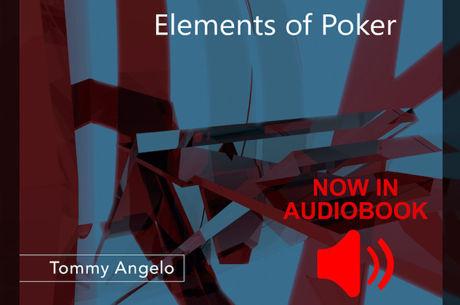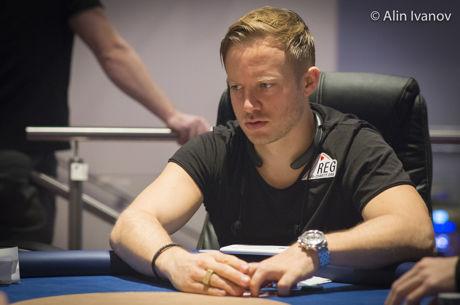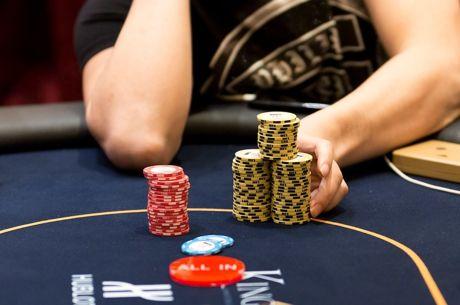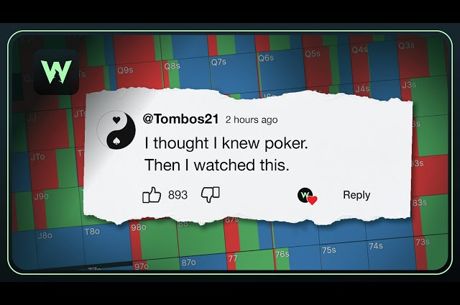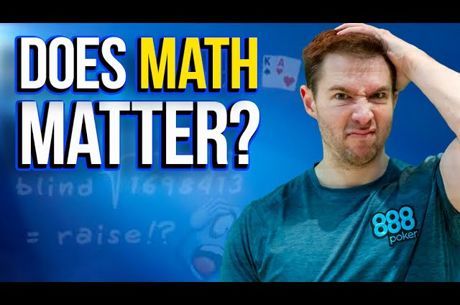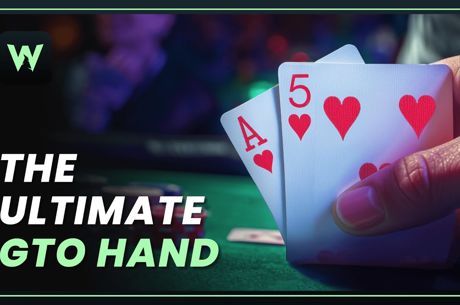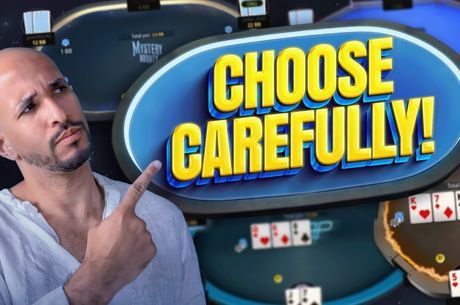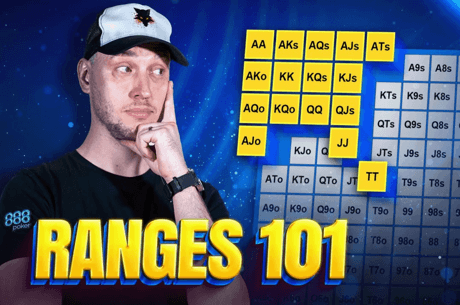Intimidate and Confuse Your Opponents By Folding Fast
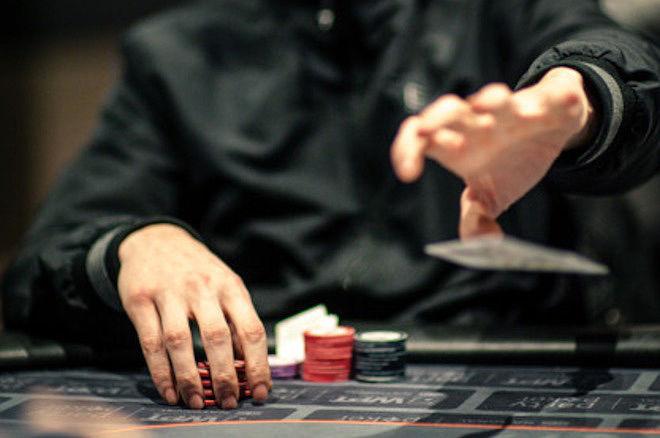
This article dissects four hands I played in the cash game area at the 2017 World Series of Poker in Las Vegas. The lens of analysis is focused not on my betting, but rather, on my timing. My strategy is pretty simple. I play fast. And I use my speed to create meta-game advantages. Perhaps you could do the same.
Hand One — Bump and Run
$5/$10 no-limit holdem
After a one-hour break, I returned to the game on my big blind, and I was happy to get no good starters for one round. My image was already tight before I left. It almost always is. And now, after being gone for a while, and then folding before the flop for 20 minutes, I had made myself invisible and harmless, setting the stage for some shenanigans.
I looked at my cards when the second one arrived. I had pocket deuces. Two players limped for $10. That right there was unusual in this game. The small blind completed. I had $2,000 and all three had me covered.
I tossed ten bucks out from the big blind, the minimum raise. I have almost never seen anyone else make this play (min-raise from the big blind after multiple limpers). That's why I do it, if the timing is right, and with this hand, at this time, it was. I'm hoping they'll think either: This guy is clueless, or He seems to know exactly what he is doing, so, what the hell is he doing?
All three limpers called $10. The pot was $80. The flop came something like KxJx8x. The small blind hesitated. He was going to bet. I saw him grabbing two red chips. Nice bet, dude! He was about to bet $10 into an $80 pot, from first position, into three players. It was a fun bet, obviously inspired by my odd preflop raise. Well played!
Because I saw it coming, I was able to muck at exactly the moment he bet $10, and then return to motionlessness, gazing forward and down. I felt the bettor's eyes swing around to stare into my right ear.
Hand Two — Do Your Thinking When They Do Theirs
$5/$10 no-limit holdem
One player limped, I made it $40 on the button, the small blind called, and the limper called. Three players.
The flop betting was check, check, check.
On the turn, they both checked. This is familiar territory to me (being checked to on the turn after the flop was checked around). It's not an auto-bluff situation for me, or even close. I need to sense vibes of non-interest from at least one opponent. That feeling of I'm ready to give up.
On this hand, I felt the give-up vibe from both players, so I bet. When the small blind didn't fold immediately, I knew he was going to check-raise and take it down. The reason I was so sure was because he had sold me on being in give-up mode, so obviously that was an act, since he didn't give up, which meant he had the goods.
The small blind paused before check-raising (as everyone does, which is reason enough to experiment with the alternative). When he said, "I raise…" the limper and I folded before he could say a number.
This is an important hand because this situation comes up often, on all streets: You raise or bet out, and your opponent pauses. Maybe he is pausing to think. Or maybe he already knows what his action will be, and he is pausing to balance his tempos with the times that he has a legitimate cause for pause. Or maybe he is attempting to send a false tell.
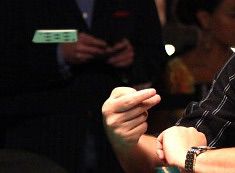
What he's really doing is giving you time to think. So, if you have anything to think about, this is when you should do it. By the time his pause is over, you should know what you are going to do if he raises. If, for example, your opponent pauses for a while and then says, "I'm all in," and you don't already know your play, then in my opinion, you are playing poor poker on this hand.
Here's what I'd like you to ask yourself: If you already know you are going to fold if he shoves, then which is better? Folding fast with confounding confidence? Or acting like you are uncomfortably undecided?
Let's apply those questions to the first hand, when I had pocket deuces. All eyes were on me, because of my suspicious preflop min-raise from the big blind. When I whiffed the flop, I knew I would be folding to any bet. When my right hand opponent bet $10 into the $80 pot, what was more likely to confuse and intimidate my opponents? Acting like I had a playable hand and then folding? Or ejecting the hand like it was the least important event of my life?
Folding fast will plant seeds of confusion in the minds of your opponents.
Hand Three — Profit from Bad Beats with Painless Folding
$2/$5 no-limit holdem
I had 5x5x on the button. UTG opened for $20. The cutoff called, I called, and both blinds folded. The pot was $67. Stacks were $1,000.
The flop was 9x6x2x, rainbow. They both checked and I bet a fast $100, using one black chip.
The UTG opener called $100 and the other player folded. Heads-up now. At this point I knew I was done putting money in this pot unless I improved.
The turn was a three. He checked the turn and I insta-checked behind with my pinky.
The river was a ten. Final board: 9x6x2x3x10x.
On the river, he checked, and I pinkied behind. He turned over 8x7x — he'd made the nut straight on the river. His check was a trap. And he had no way of knowing that I was never at risk. But that's not the point…
Anyone paying attention to this hand would know that I almost certainly got sucked out on, given that my opponent had only eight-high on the turn. That makes this a publicly viewed beat. So I wanted to be in perfect form. Even though his 8x7x was a big surprise to everyone, including me, I managed to muck immediately without movement or eye contact.
When there's a big all-in hand that ends with a suckout, do you ever look at the loser, just to see his reaction to the beat? I sure do. And I know I get looked at, because we all do.
At the moment that the table expects or hopes to see you suffering, if you can fold quickly and painlessly and exhibit no frustration, at all, every time, you will send an unmistakable message: "Nothing that happens here can hurt me." And your fearlessness will scare people, and that's exploitable.
Hand Four — Probe and Muck
$2/$5 no-limit holdem
On my big blind, I was dealt pocket jacks. The player on my left limped for $5. Let's call him Bob.
If I watch a guy play poker for several hours and he never limps, and then he limps, it sets my sirens off, and that's what happened when Bob limped. Suddenly my prime purpose was to figure out if he had a big pair.
After Siren Bob limped for $5, four players called, and now it was up to me, in the big blind, with pocket jacks. I glanced at Bob. His eyes were darting. I felt heat. My spidey sense told me that he had a higher pair than mine, and that if I raised, he would reraise. The stacks were not deep enough to set mine in a three-bet pot out of position, so I checked my option in the big blind.
Pot size: $30
Effective stacks: $600
Flop: 8x7x2x, rainbow
My hand: JxJx
I was not sufficiently convinced that Bob had a big pair to just check-fold my overpair. (Recall that so far he has a total of $5 in the pot.) But I was willing to spend $10 to become convinced. So, when the small blind checked, I bet $10, thereby forcing Bob to react, and maybe tell me what I needed to know.
My plan was as follows. If Bob folded and someone else raised, I would either reraise or call, depending on who raised and how much and all that. If Bob raised, I would fold.
Bob raised to $25. The only thing left for me to do now was to fold my cards at the exact millisecond when it became legal to do so. The other players folded fast, and I was right there with them, completing the clustermuck.
If you can fold quickly and painlessly and exhibit no frustration, at all, every time, you will send an unmistakable message: "Nothing that happens here can hurt me."
I held my forward gaze while Bob gave me a look of incredulity for underbetting $10 into four players and then folding fast for $15 more.
What range would Bob or anyone following the hand put me on if I had thought about it for a few seconds before folding? With the fast fold, and not raising before the flop, is there any way in a million years they could put me on two jacks?
For me, that's winning poker, right there. It's when my opponents put me on ranges that are wrong by a mile. Then I can ambush and value bet and other fun stuff.
Let's analyze the seeds of confusion that I planted on this hand…
If I had flopped an open-ended straight draw (the flop was 8x7x2x), I might still bet out $10, as a blocking, probing, playful bet. But then when Bob makes it $25, there's no way I'm going to fold for $15 with a good draw, and anyone guessing my ranges would assume as much. So those hands cannot be in my range. And overpairs were already ruled out, not only because of how I played it preflop and postflop, but also because of how I folded.
This means I had either bet out ten dollars into a field with absolutely nothing, which you know is impossible just from looking at me, or it means I had bet with one pair, something like Ax2x or 7x5x, and then folded to a small raise, and that's a combo that feels bizarre and impossible because players who are tight enough to fold to that $15 raise do not inhabit the same body as players who bet out $10 into four people with one weak pair.
The result is what matters. Something feels off. Something doesn't add up with that skinny old dude in seat nine. He plays too fast, like it's all been scripted out, except the plots don't quite make sense.
Ending
Are you thinking about speeding up your game? As a way to deceive your opponents? It might be harder than you think. Start by asking yourself:
Why do I pause when I know I am going to fold?
For most people most of the time, it's a pride spasm:
I don't want them to think I have nothing.
That is not a conscious strategy of deception. It's an uncontrollable impulse to play out the script that everyone follows.
Set yourself apart, and baffle your opponents. When it's your turn to fold, just fold.

World-class coach and author, Tommy Angelo is considered a modern master of poker's mental game, and has helped pros and rec players alike achieve less tilt and more focus. Called "the seminal poker text of the 21st century" by The London Times, Angelo's Elements of Poker has revolutionized how serious players approach the game. His latest book, Painless Poker, already a bestseller, can be found on Amazon.com. Connect with Tommy on Twitter @TheTommyAngelo, and visit his website: tommyangelo.com.

